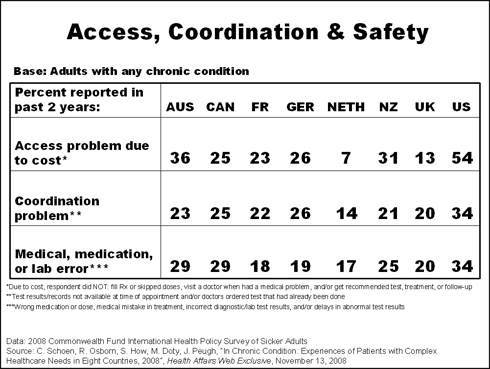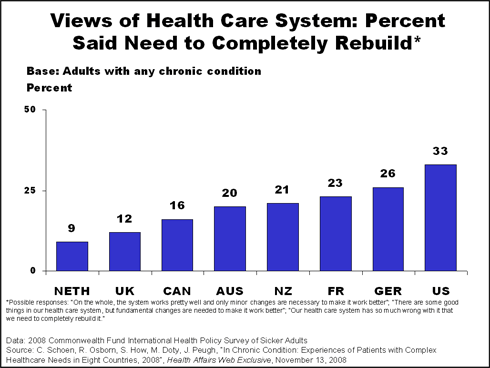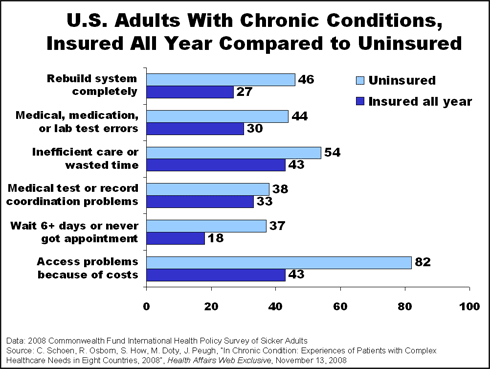U.S. Has Highest Rates Among Eight Nations of Patient-Reported Medical Errors, Wasteful or Poorly Coordinated Care, and High Out-of-Pocket Costs
Dutch Often Fare Best in Affordable, Accessible Care, Low Rates of Medical Errors
New York, NY, November 13, 2008—Compared to patients in seven other countries, chronically ill adults in the United States are far more likely to forgo care because of costs; they also experience the highest rates of medical errors, coordination problems, and high out-of-pocket costs, according to a new study from The Commonwealth Fund. Published today as a Web Exclusive in the journal Health Affairs, the eight-country survey finds that U.S. patients are significantly more likely to call for fundamental change in their country's health care system, with a third saying the system needs to be rebuilt completely.
The 2008 survey of 7,500 chronically ill patients in Australia, Canada, France, Germany, the Netherlands, New Zealand, the United Kingdom, and the United States included adults who had a diagnosis of at least one of seven chronic conditions.

More than half (54%) of U.S. chronically ill patients did not get recommended care, fill prescriptions, or see a doctor when sick because of costs, compared to 7 to 36 percent in other countries. About one-third of U.S. patients—a higher rate than in any other country—experienced medical errors or poorly coordinated care, including delays in access to medical records or duplicated tests. Reflecting cost-sharing as well as gaps in insurance coverage, 41 percent of U.S. patients spent more than $1,000 in the past year on out-of-pocket medical costs, compared with 4 percent in the U.K. and 8 percent in the Netherlands.

"The study highlights major problems in our broken health care system and the need to make major changes," said Commonwealth Fund Senior Vice President Cathy Schoen, lead author of the article. "Patients are telling us about inefficient, unsafe and often wasteful care. Moreover, a lack of access as well as poor coordination of care is putting chronically ill patients at even higher health risk."
Access Experiences Vary Widely Across Countries
In addition to access barriers due to costs, U.S. chronically ill patients often experienced long waits to see primary care physicians, difficulty getting care after hours, and often turned to emergency rooms for care. Canadians also reported such primary care access concerns.
- Only one-quarter (26%) of U.S. and Canadian patients reported same-day access to doctors when they were sick—and one-fourth or more reported long waits. In contrast, about half or more of Dutch (60%), New Zealand (54%), and U.K. (48%) patients were able to get a same-day appointment.
- U.S. patients were the most likely to find it very difficult to get after-hours care without going to an emergency room: 40 percent said it was very difficult, compared with only 15 percent in the Netherlands and Germany, the lowest rates of any country on this measure.
- In the past two years, 59 percent of U.S. patients visited an emergency room; only Canada had higher rates (64%). In both countries, one in five said they went to the ER for a condition that could have been cared for by a regular doctor if one had been available.
- In contrast to long waits for primary care, U.S. patients reported short waits for specialists. Three-quarters of patients in the U.S., as well as more than two-thirds in the Netherlands and Germany, were able to get an appointment with a specialist within a month. Waits for specialists were longest in Canada, New Zealand, and the U.K.
Errors, Poor Care Coordination, and Perceptions of Wasteful or Inefficient Care
One-third of U.S. patients—more than in any other country—reported either being given the wrong medication or dosage, experiencing a medical error, receiving incorrect test results, or facing delays in hearing about abnormal test results. Patient reports of any error were lowest in the Netherlands (17%), France (18%), and Germany (19%). Indicating inadequate tracking systems, U.S. error rates were particularly high for delays in patients getting abnormal test results.
U.S. patient experiences indicate often poorly organized, duplicate, or wasteful care:
- One third of U.S. patients (34%) experienced a time when either test results or medical records were not available or tests were duplicated, significantly higher than all other countries and more than double the coordination gaps reported in the Netherlands (14%).
- Nearly half (46%) of U.S. patients reported their time had been wasted because of poorly organized care or they had received care of little or no value during the past two years. Such perceptions of waste or inefficient care were also high in France (43%), Germany (43%), and Canada (40%). They were lowest in the Netherlands (28%) and the U.K. (27%).
Overall, Dutch patients often stand out for more positive experiences—they were the most likely to report timely, affordable access to care, experience low rates of medical errors or coordination gaps, and hold positive views about their health system. The authors observe that the contrasts between the experiences of Dutch and U.S. patients are notable and associated with the Netherlands' universal coverage (accomplished through individual mandates and private health insurance), strong primary care foundation, and widespread use of electronic medical records.
U.S. Insured as Well as Uninsured at Risk
Looking at care by insurance status within the United States, the study finds that insured as well as uninsured patients in the U.S. are at high risk for access, coordination, and safety problems. Two of five (43%) chronically ill U.S. patients who were insured all year skipped care because of costs, well above rates in other countries. However, the uninsured were at very high risk for not getting needed care, with a startling 82 percent forgoing prescriptions or recommended care despite their chronic conditions.

Experiences of inefficient care were frequent for insured as well as uninsured patients, with 43 percent of insured U.S. patients reporting wasteful or disorganized care and one-third encountering coordination problems.
"The U.S. is not only facing an economic crisis, we are facing a health system crisis," said Commonwealth Fund President Karen Davis. "Our leaders need to come together to develop reforms which will make lasting improvements for patients, to assure universal coverage and high- quality, efficient care," she said. "With the U.S. outspending all other countries, we can't afford not to reform our health care system to secure a healthier future."
Shared Challenges
The authors point out that all eight of the country health care systems face the challenge of enhancing primary care to ensure comprehensive, continuous, coordinated, and patient-centered care for the growing number of chronically ill patients anticipated in the next decade.
Assuring good transitional care when patients leave the hospital and better information flow when they see multiple clinicians is critical for avoiding errors and preventing complications, especially for those with ongoing, complex chronic conditions. More than one-third of patients in all countries reported gaps in discharge planning when they left the hospital, with the U.S. lowest at 38 percent and France the highest at 71 percent. Patients leaving with new medications often reported failure to discuss all medications they were taking, ranging from 23 percent in Germany to 41 percent or more in Canada, France, the Netherlands, and New Zealand.
Signaling a need for improved transitional care, nearly one of five (17–18%) Canadian, Dutch, and U.S. chronically ill patients with a recent hospital stay said they had been readmitted to the hospital or gone to the emergency room for complications after discharge.
In all countries, patients seeing four or more physicians were significantly more at risk of medical errors and coordination gaps. Although safety efforts have tended to focus on hospitals, the vast majority of patients in all countries (61–83%) said the errors occurred outside the hospital.
In the study, more than half of patients had two or more chronic conditions. The authors note that such "patients account for a disproportionate share of national spending, placing them at the center of efforts to improve health system performance." They conclude that public health as well as system innovations will be essential to improve care experiences and outcomes.
After the embargo lifts, the Health Affairs article will be available at http://content.healthaffairs.org/cgi/content/abstract/hlthaff.28.1.w1 or through the Fund's Web site.
The Commonwealth Fund is a private foundation supporting independent research on health policy reform and a high performance health system.
Health Affairs, published by Project HOPE, is the leading journal of health policy. The peer-reviewed journal appears bimonthly in print with additional online-only papers published weekly as Health Affairs Web Exclusives at www.healthaffairs.org.
| Methodology The survey screened random samples of adults age eighteen or older to identify those who rated their health as fair or poor or had a serious illness or disability; major surgery or been hospitalized in the past two years. The analysis is restricted to respondents who also indicated they had been diagnosed with any of seven chronic conditions: hypertension, heart disease, diabetes, arthritis, lung problems, cancer, or depression. Country samples include: Australia (593) Canada (1,966), France (861), Germany (867), Netherlands (736), New Zealand (518), U.K (933) and U.S. (1,007). The Commonwealth Fund funded the core study and partnered with the Health Foundation (U.K.) to expand the U.K. Sample, and the Health Council of Canada, Ontario Health Quality Council, and Commissaire à la Santé du Québec to expand the Canadian sample. The German Institute for Quality and Economic Efficiency Health Care funded the German sample. La Haute Autorité de Santé funded the French sample and the Dutch Ministry for Health, Welfare and Sport and the Center for Quality Care Research supported the Netherlands sample. The questionnaire was designed by The Commonwealth Fund and Harris Interactive, with advice of experts in each country. Interviews were conducted by telephone between March and May 2008. The margin of sample error for country averages are approximately: +-4 % for Australia, New Zealand and the Netherlands, +-3% for France, Germany, and the U.S., and +-2 % for Canada at the 95 percent confidence level. |